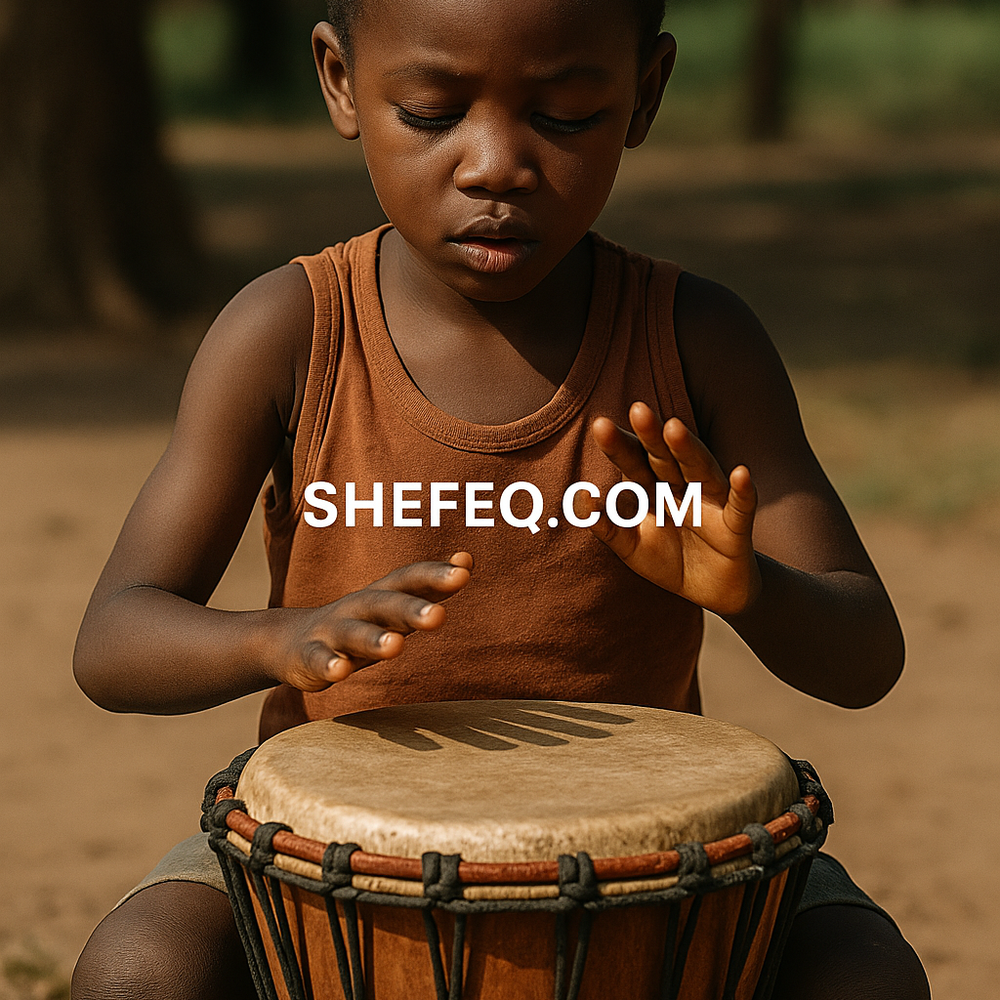I. Not Silence, But Sound Is Born
On the sun-scorched land of Africa, in the brown dust, a barefoot child runs. He doesn't speak. But from within him, a rhythm emerges.
This rhythm isn’t expressed with words, nor is it written with letters. It simply enters the body, becomes sound, becomes breath, becomes music.
Sometimes in Africa, there are no words to speak — only a sacred rhythm is needed.
This rhythm lives in the children's breath, in the clapping of hands, in the beating of drums.
They don't speak — they do speak. With music.
II. The Place Where the Drum Beats with a Child’s Breath
In a remote village, there is a drum. Its skin stretched by an old master, placed at the center of the village.
Children gather around. The youngest taps it with a finger. A small “thup.”
Then another child strikes it with a palm — a louder “THUP.”
A third child begins to create a rhythm with his fingers. The sound does not come from the drumskin, but from deep within.
That sound is their joy, their fear, their silence. The child speaks through the drum.
III. When Music Is Stronger than Poverty
In some African villages, there are no books, no paper, no schools.
But there is rhythm.
A wooden crate, an empty metal can, the shell of a freshly peeled gourd... each turns into a musical instrument.
A child strikes the box — and begins to tell his story.
Because he doesn’t want to speak — he can’t. Words weren’t given to him, but sound was.
Music is his language. And this language is more honest, more emotional, more touching.
IV. The Body – The First Musical Instrument
The child has learned to speak with his body. He stomps with his feet, slaps his chest, makes rhythmic sounds with his tongue. He beats the air with his fingers.
Notes are unnecessary for these children.
They speak with their natural frequency.
They play their own tempo, inner voice, and emotional state through their bodies.
Here, music is not instruction — it is instinct.
And this music lives not in the body’s memory, but in the soul itself.
V. Games That Become Songs
The games of African children are not just movements — they are rhythmic rituals.
They form a circle. One stands in the center, the others build rhythm around:
-
“Hand-hand-finger” rhythm
-
Call-and-response patterns (“senqala!” – “senqala!”)
-
Sequential sounds created by the touching of bodies
This is a language built by the group — through music.
They don’t need to look at each other to speak. They hear each other without seeing.
VI. Lullabies – Touching with Music
In Africa, mothers speak not with words, but with lullabies.
They take the baby in their arms, rock gently, and sing to the pulse of their heartbeat.
The lullaby is not just the mother’s words — it is her prayer, her fear, her dreams.
The child understands this music before knowing any language.
And he feels: this sound protects me.
VII. Music Comes from the Blood
In Africa, music doesn’t come from books or schools.
They know music without reading or hearing it.
Because in Africa, music is not from memory — it is from the blood.
The grandfather’s war drum, the mother’s lullaby, the sister’s call — all of it is inheritance.
And this heritage is passed on not by words, but by sound.
VIII. Rhythms That Speak to Nature
An African child, in the midst of drought, strikes the ground with his foot. As if asking the earth:
“Shall I wake you up?”
Sometimes after the rain, the drums sound different.
Each season, each day, even each tree has its own sound.
The African child knows this sound.
Because nature in Africa does not speak — it responds through music.
And the child speaks back in the same language.
IX. Freedom – A Feeling Turned into Sound
When an African child speaks through music, he is not delivering a report.
He is not protesting, nor explaining.
He is simply speaking.
That speech is freedom.
It is the expression of pain, hope, and selfhood.
Music makes him say everything he was never told to say.
X. Listening to the Child – Understanding Humanity
We speak much, but say little.
They speak little, but say much.
Sometimes, a child simply plays a rhythm — but within that rhythm, we hear the entire world.
Because in Africa, music is not communication — it is existence.
When a child plays a rhythm, he is not merely playing — he is speaking, calling, remembering.
And at the end, a question:
Have you ever felt what a child says without words?
What was hidden in the rhythm he played?
Even if he didn’t speak — did you feel him touch your soul?
Leave a thought — your silence, too, can become music.
Shefeq.com — A place for those who speak with the soul.

